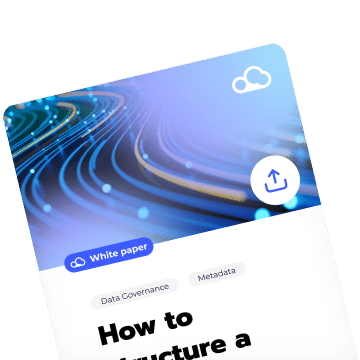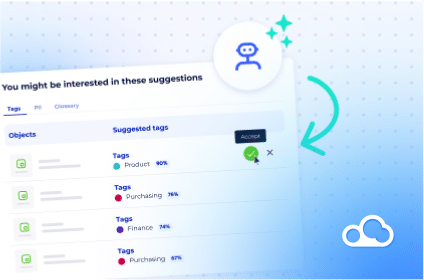Over the years, technological milestones enabled organizations to process and store vast amounts of data at unprecedented speed and scale, and these advancements changed the very fabric of business operations. Organizations can now harness the power of data to gain valuable insights, make informed decisions, and deliver data products that add tangible value to their customers. This evolution transformed data from a simple operational tool to a strategic business asset.
This article aims to connect technical data knowledge with practical business implementation to analyze the essential components required for creating successful data products and to provide a comprehensive understanding of their significance in the data-driven economy.
Defining data products & their value
Let’s start with the basics: A data product is a product created with the primary goal of using data to achieve a specific objective. Data products provide tools and insights to navigate complex markets and deliver quantitative and qualitative impacts on business outcomes. They enable businesses to respond to customer needs in real time, adapt their strategies swiftly, and stay ahead of the curve.
Think of them as the offspring of traditional software products and insightful data sets. For instance, consider a predictive maintenance system used within manufacturing industries. This data product analyzes equipment data to predict potential failures before they occur and helps reduce downtime and maintenance costs. Another example is a personalized health tracker that analyses individual biometric data to offer customized health and fitness reports. Both of these products heavily rely on data to offer services to their users.
The rising popularity of data products can be attributed to two main reasons: First, data helps to build products that respond to user and customer needs. Second, companies have understood the value of data-driven insights in decision-making. Ultimately, the success of a data product depends on its ability to effectively utilize data to solve a particular problem or meet a specific need, whether it’s for the end-user or a company.
One key characteristic that sets data products apart is their reliance on data as the driving force. In traditional software, data might play a supporting role, but in data products, it takes center stage where data is not just an element but often the main attraction. For instance, Spotify’s success is deeply intertwined with its data-driven music recommendation system. This system analyzes user listening habits and preferences to suggest new songs and playlists, which is pivotal in enhancing user experience and engagement, thereby underlining Spotify’s data-centric approach to its service.
Data products manifest in various formats
Different products that are built for and around data can be called data products. These products may include software applications, data visualizations, dashboards, and more.
Companies such as Waze and Spotify have revolutionized how we navigate and consume music, respectively, by leveraging data. Similarly, Netflix has transformed the entertainment industry by using viewer data to recommend content. All of these products have successfully used data to deliver value to their users.
Data products can also be categorized based on where they’re used within organizations. Internally, they enhance operational efficiencies, while externally, they focus on improving customer experiences. Salesforce business is a prime example of data products internally used by companies. This company provides products that assist other businesses in managing their sales and marketing operations data. Like any other product or service, a data product can be marketed to either businesses or individual customers.
Driving business decisions
In the pre-data era, decisions were often guided by gut feelings and educated guesses, but data products have turned the tide by enabling organizations to make decisions based on hard facts, real numbers, and concrete insights. The real game-changer was not merely moving from no data to some data but instead transitioning from a limited amount of data to a colossal volume of significant data, utilizing the potency of statistics and the law of large numbers. It’s like trading in your fortune cookie for a crystal-clear data report.
Companies now specialize in creating data products to provide essential guidance and clarity for solving complex problems in various industries. They build their products around data to deliver critical insights and knowledge, enabling businesses to make informed decisions and address challenges effectively.
Innovative problem solving
Imagine trying to find your way with a blindfold on, as opposed to having a treasure map to guide you. Data products act as that map, providing guidance to tackle complex problems in various industries.
For instance, in the field of finance, data products are instrumental in safeguarding against risks and fraud. They help financial institutions monitor and analyze transactional data to detect any unusual activity that may indicate fraudulent behavior. Data products can also assist in providing personalized customer experiences by analyzing customer data to offer customized financial services that meet individual needs.
In the retail and e-commerce industry, data products enhance customers’ shopping experience. By analyzing customer data, these products can serve as shopping assistants, suggesting products matching customer preferences and buying habits. They can also assist in managing inventory by analyzing sales data and predicting trends, ensuring that retailers always have the right products in stock to meet customer demand.
Data products help businesses identify distinct opportunities and optimize their strategies. For users, particularly in user-centric data products, this results in more customized experiences and services. These innovative solutions, powered by data, benefit both the business in terms of strategic decision-making and the end-user in terms of personalized engagement and satisfaction.
Versatility across industries
Data products are not one-trick ponies: They excel in several areas. Whether in healthcare, finance, retail, or any other industry, understanding your users’ preferences and behaviors is priceless. In this context, data products can be designed to extract these valuable pieces of information.
Conclusion
In conclusion, the evolution of data from a mere operational tool to a strategic business asset has given rise to a new era of innovation and efficiency. From predictive maintenance systems in manufacturing to personalized health trackers and entertainment platforms like Spotify and Netflix, data products have become integral in delivering tangible value to both businesses and end-users. The reliance on data as the driving force sets them apart, offering a crystal-clear perspective in decision-making, revolutionizing problem-solving, and enhancing user experiences.
As businesses increasingly embrace data-driven insights, the versatility of data products shines through, proving their effectiveness across healthcare, finance, retail, and beyond. In the data-driven economy, the success of organizations hinges on their ability to harness the power of data products, transforming complex challenges into opportunities for growth and optimization.
Interested in learning even more about using your data as an asset? Speak with an expert and book a demo today to get started on your organization’s journey to complete data lifecycle management with DataGalaxy!





